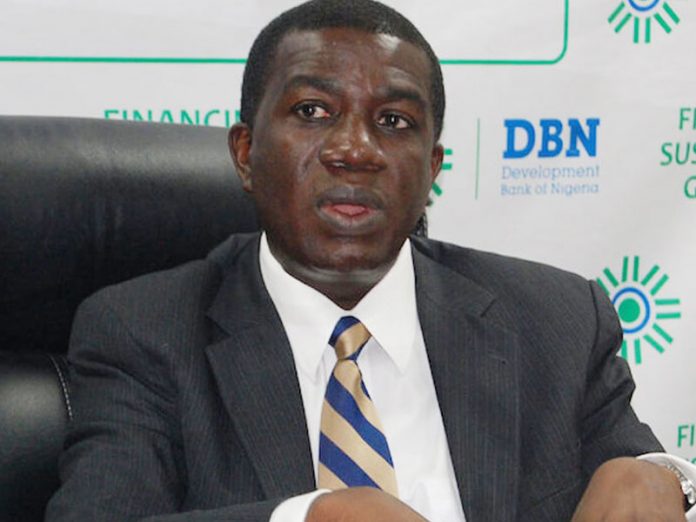Development Bank of Nigeria (DBN) disbursed over N30 billion loans to 35, 000 Micro-Small and Medium Enterprises (MSMEs) in its first operating year of 2017.
Prof Joseph Nnanna, DBN Assistant Chief Economist, disclosed this at the Fidelity Bank Plc Small and Medium Enterprises (SME) forum in Lagos.
Nnanna said the money was disbursed to MSMEs across manufacturing, construction, creative industry and agriculture, among others.
He said loans were disbursed through the bank’s various Participating Financial Institutions (PFIs) in line with its mandate of strengthening MSMEs growth.
Nnanna said the bank also engaged in partial credit guarantees through its subsidiary company Inter Credit Guarantee located in Lagos, apart from loan disbursement.
According to him, the company is presently running a capacity building programme for 100 MSMEs to ensure they have the right tools to utilise the funds being disbursed to them.
“We also provide technical and capacity building, right now, we are running a capacity building programme for 100 MSMEs to ensure they have the right tools to utilise the funds they received judiciously, to grow their various businesses,” Nnanna stated.
He said with a vision to be Nigeria’s primary development finance institution; promoting growth and sustainability, DBN sought to fulfil three key mandates.
Nnanna said the mandates were to ensure access to finance for MSMEs by lending to PFIs, provide capacity building for PFIs institutions to enhance their ability and willingness to lend to the MSME segment.
He said the third mandate was to provide partial credit guarantees for PFIs to encourage them to take the risk of lending to MSMEs.
Nnanna noted that DBN ensured that loans disbursed through its various PFIs and Development Finance Institutions (DFIs) got to end beneficiaries and were being judiciously used.
“The entrepreneurial challenge in Nigeria is one of the factors causing banks not to lend to the MSMEs segment.
“It is not as if these SMEs are not good but they are work in progress as they lack good book-keeping records, financial management and lack of corporate governance structure.
“So you have situations where they are not fully equipped and so banks tend to shy away from this segment and that is why lack of funding for SMEs persists,” Nnanna said.
He, however, expressed optimism that MSMEs would have access to credit through DBN that came on board in 2017 and its mandate of improving access to credit to MSMEs.
Nnanna noted that many commercial banks would lend to the real sector with the new Central Bank of Nigeria (CBN) circular on loan to deposit ratio (LDR) of 60 per cent.
He explained that banks below the 60 per cent mark would be compelled to look for better grants and customers to avoid being sanctioned by the apex bank ahead of Sept. 30, deadline.
“The circular will prompt the banks to look for better grants, customers so that they can meet that target and that is happening between now and Sept. 30.
“I am confident that more funds will be coming out to the MSME segment.
“I believe more access to finance is coming because of plethora of issues in the country but more importantly we need credit in the MSME segment since we all agree it is the backbone that drives any economy,” Nnanna said.
Nnanna, who commended the apex bank’s directive aimed at strengthening the real sector, stressed the need to build the capacity of SMEs to avoid rise in banks non-performing loans (NPLs).
“Ultimately, I submit that although it’s a good thing, together we still need to build the capacity of SMEs to absorb these funds unless NPLs will increase if they don’t manage the funds well,” he stated. (NAN)


